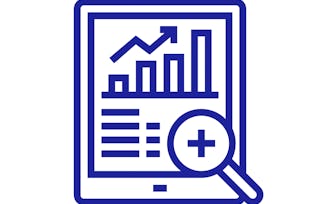Whether you’re an aspiring data engineer, data architect, business analyst, or data scientist, strong data warehousing skills are a must. With the hands-on experience and competencies, you gain on this course, your resume will catch the eye of employers and power up your career opportunities.

Data Warehouse Fundamentals
Ends soon: Gain next-level skills with Coursera Plus for $199 (regularly $399). Save now.

Data Warehouse Fundamentals
This course is part of multiple programs.


Instructors: Ramesh Sannareddy
43,095 already enrolled
Included with
(251 reviews)
Recommended experience
What you'll learn
Job-ready data warehousing skills in just 6 weeks, supported by practical experience and an IBM credential.
Design and populate a data warehouse, and model and query data using CUBE, ROLLUP, and materialized views.
Identify popular data analytics and business intelligence tools and vendors and create data visualizations using IBM Cognos Analytics.
How to design and load data into a data warehouse, write aggregation queries, create materialized query tables, and create an analytics dashboard.
Skills you'll gain
Details to know

Add to your LinkedIn profile
See how employees at top companies are mastering in-demand skills

Build your subject-matter expertise
- Learn new concepts from industry experts
- Gain a foundational understanding of a subject or tool
- Develop job-relevant skills with hands-on projects
- Earn a shareable career certificate

There are 3 modules in this course
Welcome to your first module! This module provides an introduction to data warehouse systems, data lakes, and data marts. When you complete this module, you’ll be able to identify and compare data warehouse systems, data marts, and data lakes based on their architecture, and understand how organizations can benefit from each of these three data storage entities. Then, you’ll learn about three types of data warehouse systems and popular data warehouse system vendors. You will learn to help your organization assess new data warehouse system offerings when you know the five essential, critical criteria, including the total cost of ownership, to evaluate before changing to a new data warehouse system.
What's included
8 videos2 readings2 assignments2 plugins
In this knowledge-packed module, you’ll explore general and reference enterprise data warehousing architecture. You’ll discover how data cubes relate to star schemas. Then, you’ll learn how to slice, dice, drill up or down, roll up, and pivot relative to data cubes. Next, you will examine the capabilities of materialized views, their benefits, and how to apply them. You’ll learn how a data organization using facts and dimensions and their related tables organizes information. Then, you will explore how to use normalization to create a snowflake schema as an extension of the star schema. You will also learn about populating a data warehouse, incremental data updates, verifying data, querying data, and interpreting an entity-relationship diagram for a star schema. Finally, the module will delve into the creation of a materialized view, the application of cube and rollup options, and examine the advantages organizations gain from implementing staging.
What's included
8 videos4 readings2 assignments5 app items
In this module, you’ll complete your practice project and final course project, which bring together concepts and practices you previously learned in the first two modules. In the final project, you will design and load data into a data warehouse using facts and dimension tables. Then you’ll write aggregation queries using cube and rollup functions and create a materialized view. In the optional lesson, you will explore the workings of IBM Db2 data warehouse system architecture, view use cases, and understand the key capabilities and integrations available with IBM Db2 Warehouse. The hands-on labs in this lesson will enable you to gain practical knowledge on how to create a Db2 service instance, how to populate a data warehouse using IBM Db2, how to query the data warehouse using IBM Db2.
What's included
1 video5 readings1 assignment1 peer review5 app items5 plugins
Earn a career certificate
Add this credential to your LinkedIn profile, resume, or CV. Share it on social media and in your performance review.
Offered by
Explore more from Data Management
 Status: Free Trial
Status: Free Trial Status: Free Trial
Status: Free TrialLearnQuest
 Status: Free Trial
Status: Free TrialUniversity of Colorado System
 Status: Preview
Status: PreviewNortheastern University
Why people choose Coursera for their career




Learner reviews
251 reviews
- 5 stars
76.37%
- 4 stars
11.02%
- 3 stars
5.11%
- 2 stars
2.36%
- 1 star
5.11%
Showing 3 of 251
Reviewed on Mar 29, 2023
practical knowledge as per real time project is more important that is not provided here
Reviewed on Sep 25, 2022
Really great introduction to Data warehouses, applications and operations inside them.
Reviewed on Sep 14, 2023
It was awesome experience to Data warehousing and BI analytics

Open new doors with Coursera Plus
Unlimited access to 10,000+ world-class courses, hands-on projects, and job-ready certificate programs - all included in your subscription
Advance your career with an online degree
Earn a degree from world-class universities - 100% online
Join over 3,400 global companies that choose Coursera for Business
Upskill your employees to excel in the digital economy
Frequently asked questions
To access the course materials, assignments and to earn a Certificate, you will need to purchase the Certificate experience when you enroll in a course. You can try a Free Trial instead, or apply for Financial Aid. The course may offer 'Full Course, No Certificate' instead. This option lets you see all course materials, submit required assessments, and get a final grade. This also means that you will not be able to purchase a Certificate experience.
When you enroll in the course, you get access to all of the courses in the Certificate, and you earn a certificate when you complete the work. Your electronic Certificate will be added to your Accomplishments page - from there, you can print your Certificate or add it to your LinkedIn profile.
More questions
Financial aid available,
¹ Some assignments in this course are AI-graded. For these assignments, your data will be used in accordance with Coursera's Privacy Notice.

